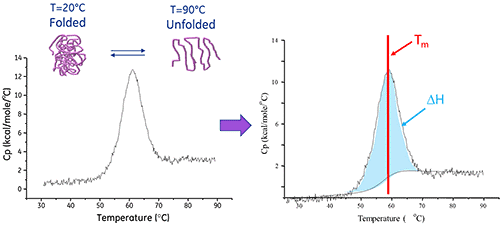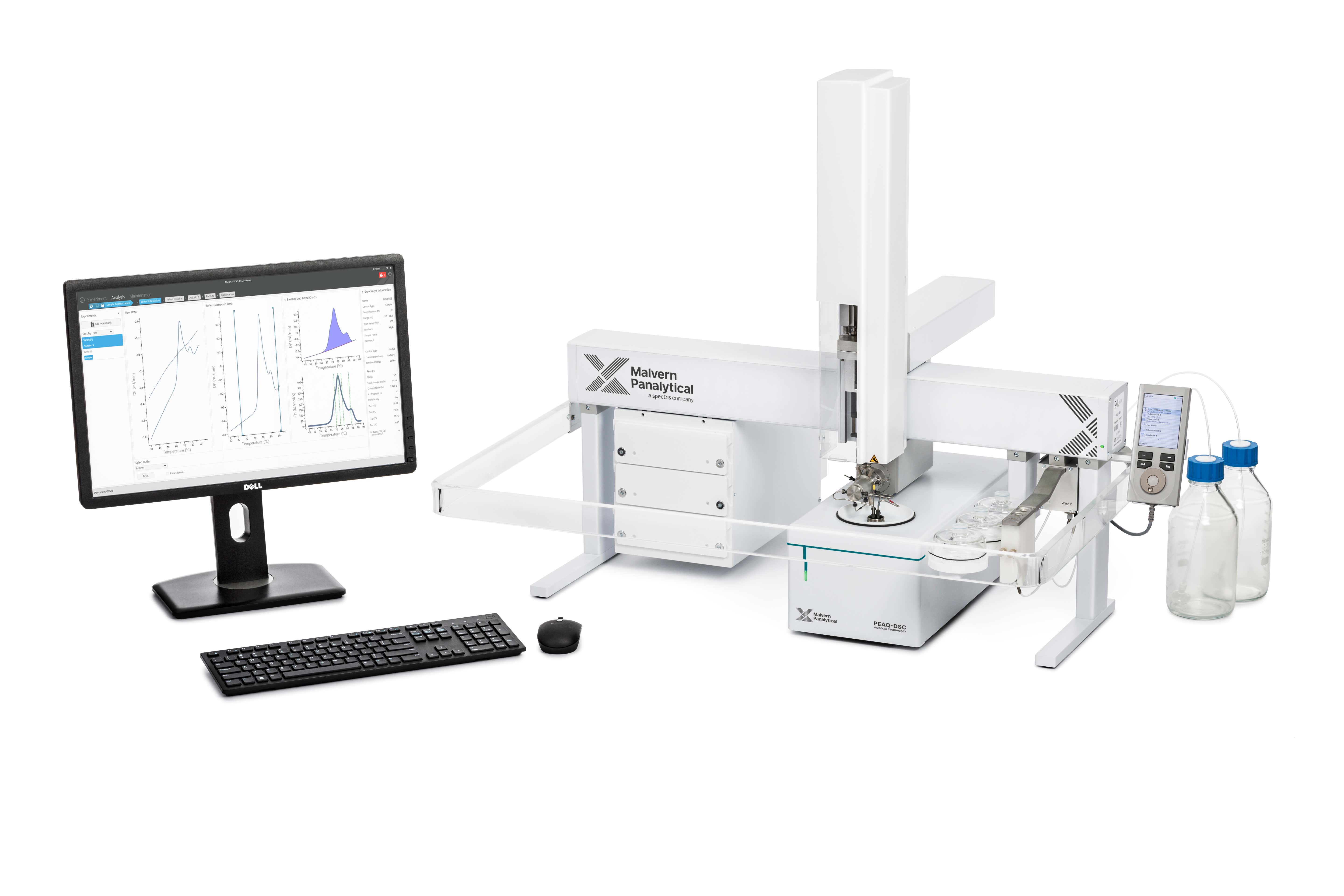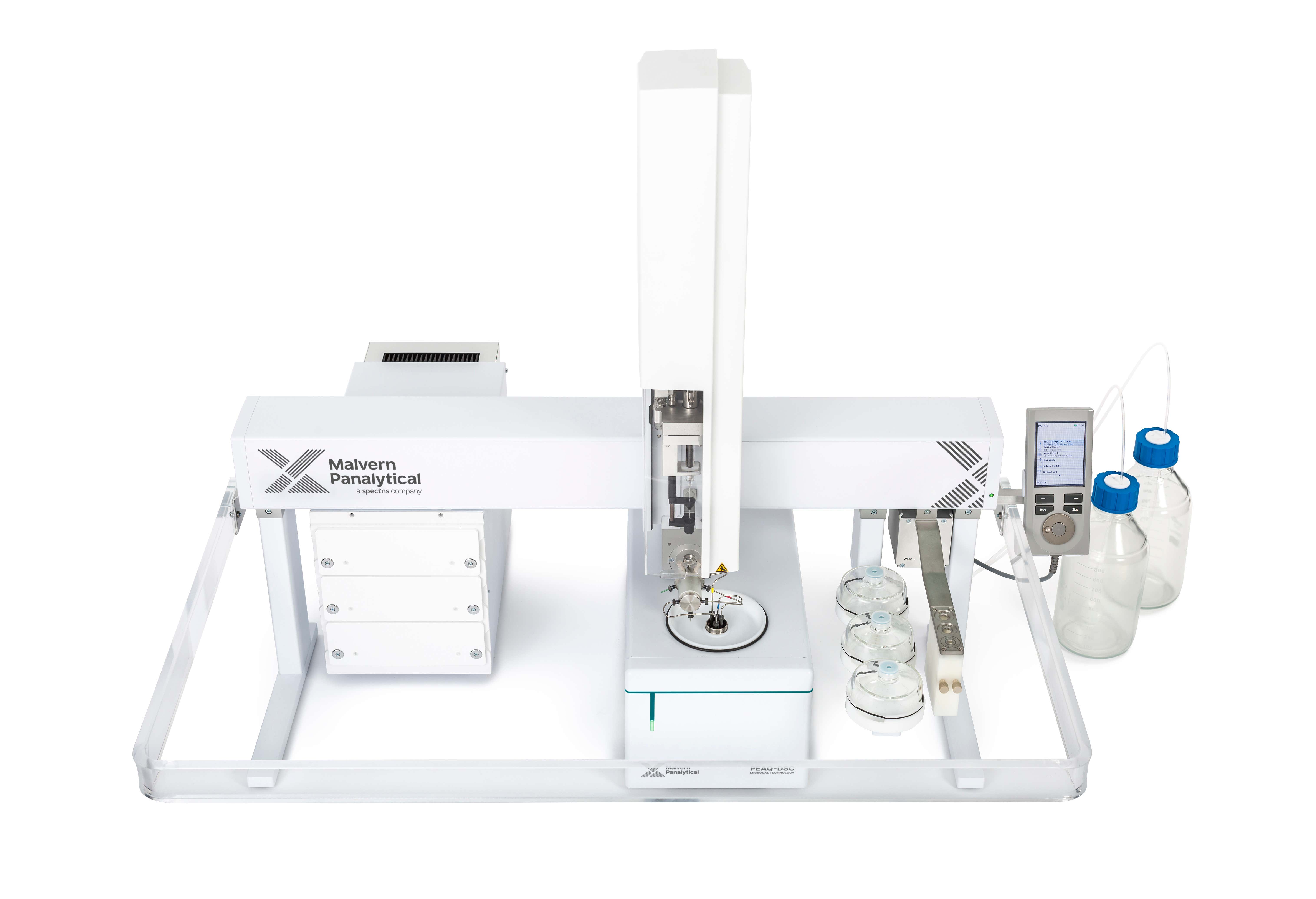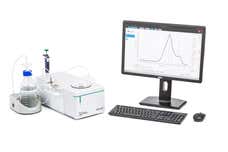Features and benefits
Differential Scanning Calorimetry (DSC) is a powerful analytical tool for characterizing the thermal stability of proteins and other biomolecules. The technique measures the enthalpy (ΔH) and temperature (Tm) of thermally-induced structural transitions of molecules in solution. This information provides valuable insights into factors that stabilize or destabilize proteins, nucleic acids, micellar complexes and other macromolecular systems. The data are used to predict shelf-life of biomolecular products including biopharmaceuticals to enable batch-to-batch and biosimilar versus innovator molecule comparisons, to develop purification strategies, to characterize and evaluate protein constructs, and to rank the affinities of ligands to their protein targets in small molecule drug discovery programs.
The high-throughput, high-sensitivity MicroCal PEAQ-DSC Automated system features software that streamlines workflows through simplified experimental setup and flexible instrument scheduling. Automated data analysis supports the generation of high integrity thermal stability data and delivers compliance with regulatory requirements, whilst allowing easy integration into existing data handling and transfer systems.
Key Features
- Gold standard stability-indicating technique requiring minimal assay development
- Direct and label-free measurement of biomolecular native-state stability in solution
- Standard 96-well plate format for high capacity and easy loading, with thermostatically-controlled storage of up to 6 plates
- Fully integrated autosampler enables unattended analysis of up to 50 samples per day
- Automated cell filling and cell cleaning functions permit unattended operation
- Measurement of very tight binding constants, up to 1020M-1
- Powerful MicroCal PEAQ-DSC software minimizes typical data analysis time and includes:
- PEAQ-Compliance: The system is available with Malvern Access Controller (MAC) to limit access to user-defined SOPs and data analysis features. Data can be displayed using the Report Generator with user details and the ability to sign using electronic signatures to facilitate the integration of the workflow into your company’s quality system and aid compliance with 21 CFR Part 11 and Annex 11 regulations. This is provided as an optional accessory
- PEAQ-Performance: Automatically detects and validates system readiness for optimal performance
- PEAQ-Smart (including PEAQ-Finder): For SOP-based operation and data analysis. Provides new algorithms to detect even subtle peaks and shoulders, facilitating the automatic, non-subjective identification of multiple transitions, such as those seen in multi-domain proteins
- PEAQ-Compare: For the quantitative comparison of DSC traces for comparability studies, ideal for batch-to-batch and biosimilarity studies
- Network-ready: email updates sent during the analysis to keep you informed of assay progress
The MicroCal PEAQ-DSC is also available as a manual system without the autosampler.
How it works
Functional structures formed by proteins and other macromolecules often undergo temperature-induced conformational changes, such as unfolding. These changes result in the absorption of heat as a result of the redistribution of non-covalent bonds within the molecule. Differential Scanning Calorimeters measure this heat uptake very precisely.
The thermal core of the MicroCal PEAQ-DSC Automated system contains a sample cell (containing the sample of interest) and a reference cell (containing a matched buffer solution), both of which are housed within an insulating jacket. These two cells are always maintained at the same temperature, and during a measurement, they are heated at a constant scan rate.
As the molecule within the sample cell unfolds, heat is absorbed, creating a temperature difference (ΔT) between the sample cell and the reference cell. This results in a thermal gradient across the Peltier units, creating a proportional voltage, which is in turn converted to power to form a feedback loop to the Peltier units, in order to return ΔT to zero.
Since protein unfolding is an endothermic event, it is observed as a positive displacement in the thermogram. The midpoint of this protein ‘melting’ transition is the Tm, and the area under the curve is the enthalpy (ΔH) of the unfolding process (please see figure below).

Data analysis and measured/derived parameters are described in greater detail on the Differential Scanning Calorimetry technology page.
Specification
General
| Technology | Differential Scanning Calorimetry |
|---|---|
| Measurement type |
Temperature midpoint (TM)
Enthalpy (ΔH)
Heat capacity change (ΔCp)
|
Ce
| Cell | Capillary |
|---|---|
| Cell material | Tantalum |
| Cell volume | 130 μL |
Sample
| Sample capacity | 288 (6 × 96-well plates) |
|---|---|
| Sample volume | 325 µL |
| Typical sample concentration | 0.01 mg/mL – 10 mg/mL 1 |
| Sample throughput | ≤50 samples/day |
| Sample storage temperature range | 4°C - 40°C |
System
| Noise | 0.05 μCal/°C 2 |
|---|---|
| Baseline repeatability | 1 μCal/°C 2 |
| Response time | 5s 2 |
| Repeatability | <0.2 µCal/°C 3 |
| Reproducibility | <0.08°C St. Dev. TM and <2% RSD on ΔH 4 |
| System reproducibility | <0.1°C St. Dev. TM and <5% RSD on ΔH 4 |
| Multiple feedback modes | Yes (passive, high gain and low gain) |
| Temperature range | 2°C to 130°C 2, 5 |
| Maximum scan rate | 240°C/h |
| Reverse scanning | Yes |
| Pressure perturbation calorimetry (PPC) | N/A |
| Cleaning routines | 3 pre-programmed routines |
| Cleaning solvents | Water and detergent used as standard |
Software
| 21 CFR part 11 | Yes, with PEAQ-Compliance software option |
|---|---|
| Network ready | Yes, with email alert capability |
Operating environment
| Operating temperature (°C) | +10°C to +28°C |
|---|---|
| Storage temperature | -20°C to +50°C |
| Humidity | 10% to 70%, non-condensing (10% to 90% for storage) |
| Ingress Protection (IP) rating | IP21 |
| Power | 100-240 V A/C, 50/60 Hz, 70 W (cell), 400 W (max, autosampler), PC as supplied |
| Certification | CE (EN61010-1), EMC (EN61326-2-1, EN61326-1, FCC, ICES, VCCI), ISO9001:2008 |
Weight and dimensions
| Dimensions (W, D, H) | 101 cm × 68 cm × 70 cm |
|---|---|
| Weight | Approx. 25 kg |
Notes
|
1 Sample dependent 2 Typical results for ribonuclease (RNase) in 50 mM KAc buffer at pH 5.5, at 60°C/h with high feedback 3 Rescans of a stable buffer 4 Using ribonuclease (RNase) 5 Range may be extended down to -10°C upon request |
Support
Protect your investment and ensure optimized performance at all times with Malvern Panalytical's service plans.
When you purchase a Malvern Panalytical product we understand that this is just the first stage of a working relationship that will last for the lifetime of the instrument. Depending on your needs, Malvern Panalytical will provide the support for your business.
Help Desk
- Telephone and email support.
- Operators who take responsibility for your call and ensure your query is answered.
Training
- User training events
Software downloads
Malvern Panalytical's service options- choose the right plan for you:
Malvern Panalytical Platinum Plan
For laboratories where maximizing instrument up-time is critical to its daily performance. Our highest level of response and the 'all inclusive' price plan takes care of those unexpected repair bills should the unfortunate occur.
Malvern Panalytical Gold Plan
Enhance your laboratory productivity by maintaining instrument efficiency. Still receive that priority response, combined with specialist technical and software support, we'll keep your instrument performance on track to deliver.
Malvern Panalytical Bronze Visit
For laboratories looking to optimize instrument performance, regular preventative maintenance is essential.
| Platinum Plan | Gold Plan | Bronze Visit | |
|---|---|---|---|
| Annual PM/PV Test | yes | yes | no |
| Telephone / Email Support | yes | yes | no |
| Priority Response | yes | yes | no |
| Emergency Breakdown visits* | yes | yes | no |
| Parts Included | yes | no | no |
| Technical & Software Support | yes | yes | yes |
| IQ/OQ (Pharma)*** | yes | yes | yes |
*including labour & travel costs ***available at an additional cost
Key Applications
Biotherapeutic Discovery, Development and Manufacturing
The MicroCal PEAQ-DSC Automated is trusted throughout the biopharmaceutical industry to provide valuable stability data for biotherapeutics in discovery, development and manufacturing. This is because of the universal nature of the detection method, the ability to detect very subtle changes in the conformation of biologic drugs and the high reproducibility of the data.
Webinar: Solve stability problems in preformulation and process development using DSC
Application note: Using Differential Scanning Calorimetry to accelerate liquid formulation development for protein biopharmaceuticals
Biosimilarity and Biocomparabilty
The highly reproducible nature of the MicroCal PEAQ-DSC instruments and the ability of the technique to detect even changes to a single amino acid in a protein have been the core drivers behind the use of DSC data in submissions for approval for biosimilar drugs. The MicroCal PEAQ-DSC software has a biosimilarity tool for statistical comparison with the innovator drug.
Characterization of Antibody Drug Conjugates and Vaccines
DSC, DLS and other biophysical technique can be used to study the stability of Antibody Drug Candidates and the effects of antibody drug ratios on their stability and propensity to aggregate. The example below also show how DSC can be used to measure the kinetics of inactivation by heating over a broad range of scan rates.
Webinar: Biophysical and stability characterization of antibody-drug conjugates






